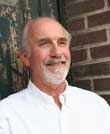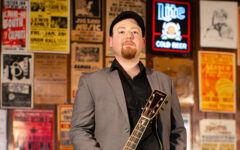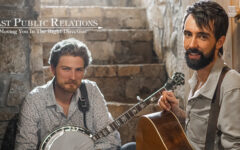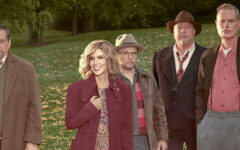 The following article, originally titled Greg Cahill – Reflections From On The Road, appears in the current issue of British Bluegrass News (Spring 2009). He composed it upon returning from a three week tour by Special Consensus in the British isles earlier this year.
The following article, originally titled Greg Cahill – Reflections From On The Road, appears in the current issue of British Bluegrass News (Spring 2009). He composed it upon returning from a three week tour by Special Consensus in the British isles earlier this year.
BBN has graciously allowed us to reproduce it here, believing it conatins valuable insight and information for other US bands considering a tour of the UK.
 I have just returned home from a wonderful tour of Ireland, Scotland, England and back to Ireland with The Special Consensus. The band has completed this bi-annual tour since the early 1990s and we have developed many great friendships with promoters, friends and fans alike.
I have just returned home from a wonderful tour of Ireland, Scotland, England and back to Ireland with The Special Consensus. The band has completed this bi-annual tour since the early 1990s and we have developed many great friendships with promoters, friends and fans alike.
This tour was quite lengthy – we arrived in Dublin on January 13 and played shows every night from January 14 through February 3, and returned to the USA on February 4. Although we were pretty tired by the 21st day of concurrent performances, we truly had a wonderful time and greatly appreciate the support of everyone who came out to hear the band.
For travelling bluegrass bands, touring and performing to audiences in different countries is a most interesting and very enjoyable experience. Every town in every country has its own history and personal identity, which makes for a wonderful learning experience. Different cultural perspectives and habits, from types of meals served, food preparation, drinks indigenous to the region, political and religious opinions, etc., make each town and city a "brave new world" to explore before even arriving at the concert venue.
One of the first factors to consider when contemplating scheduling a tour of foreign lands is airfare. It is always very helpful to determine the best destination city that might be a "hub" of sorts to begin a tour, and it is also very cost effective to book round trip airfare whenever possible. I always check several airfare options to have at least a general idea of the major travel expense before scheduling any dates so I have an idea of how much money will be necessary to pay travel expenses and then pay the band. This information is invaluable in determining what fee to request per show and then how many bookings it will take to earn the desired amount necessary to make the tour feasible.
It seems that most "full time" professional touring bands in the US are used to long drives between engagements. It is not unusual for a band to play at a festival in Kentucky one day and, perhaps after an all-night drive, appear at a festival in Minnesota the next day. The Special C drives to about 70% of the shows and flies to the other 30%. Our impression of the scene in the UK and Ireland is that a three hour drive is considered quite long, whereas this is more the norm for US bands. It also seems to us that bands in mainland Europe fall somewhere between these drive time parameters; they may be comfortable with even a five or six hour drive but would also certainly balk at a 10 or 12 hour all-night drive. I would certainly suggest that bands planning a tour of different countries plot the drives when scheduling the shows to be sure they will be able to comfortably get to each show (and "comfortably" is relative to the usual band tour experience).
Since The Special C began touring in Ireland and the UK in the 1990s, we prefer to drive ourselves throughout the tour but bands that are coming over for the first time might consider hiring someone to drive them around (especially if not familiar with "driving on the wrong side"). Car rental and insurance can be expensive and should be arranged before arrival in country, as larger vehicles are sometimes less available. Travel by air or ferry between countries should also be investigated before travel days. While Ryan Air and Easy Jet offer great values, we have no longer been able to take advantage of these flights since the downsized weight restrictions were enacted (our suitcases are packed with clothing for several weeks and are therefore usually too heavy for these flights without paying exorbitant excess weight fees). We usually ferry between Ireland and England/Scotland, most often with the vehicle we have rented from the agent who books the band in this region. We also limit our luggage to one large suitcase, one carry-on bag and an instrument per band member.
Accommodation in the various countries of Europe are similar but not identical to accommodation in the US. Hotel and motel rooms are actually quite similar but B&B lodging is a bit less common in the States. And a light, non-cooked breakfast ("continental breakfast") is often the norm for many of the more affordable US motel chains.
Sound quality for concert performances seems to vary a great deal in all countries (including the USA). Equipment and knowledgeable engineers are obviously key factors, but another is the perspective of the promoter. I believe a band will sound much better if allowed to use the usual stage setup. We occasionally encounter promoters who not only have not requested a stage plot from the band in advance (so they have no idea how many microphones, stands, cables, etc. will be necessary) but also insist on the band using their preferred setup (e.g., one mic for the entire band rather than individual mics). It is the responsibility of both the band and the promoter to communicate about the sound requirements in advance of the concert. We always carry instrument mics over with us for "emergency" use. Setting the sound check time before arrival in town is also helpful so the band will know if they should have dinner before or after sound check.
CD sales are a major part of our income and usually pay a major percentage of our travel expenses. Since we are usually playing for a much lower guaranteed fee than our usual fee in the US, it is much appreciated when the promoters do not request any portion of the CD sale income (and this agreement should be either part of the contract or a contract rider).
The joy of finally making the music for very receptive and enthusiastic audiences is, of course, the primary reason for completing the tour. I always enjoy the audiences in Ireland, England and Scotland because, for the most part, they have come to hear the music and they are quite knowledgeable about the genre (and many are musicians themselves). The main difficulty we encounter is not getting enough sleep because we somehow usually end up in a session or at least a visit with the local musicians and concert attendees after the show, and consequently we stay up far too late when we have to rise fairly early to drive to the next town the following day (while the locals enjoy sleeping in!).
I have made countless friends around the world through the connection of music, and I truly believe I will leave this world a wealthy person, as my credo is that the true wealth of the world is the experiences we encounter on the "path with heart" in life and the friends we make. I look forward to (hopefully) many more years of playing the music I love, of meeting new friends and of spreading the joy of bluegrass music to all who will listen!
All the best,
Greg Cahill







